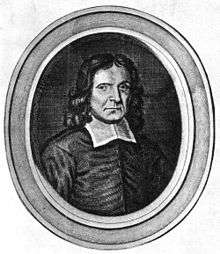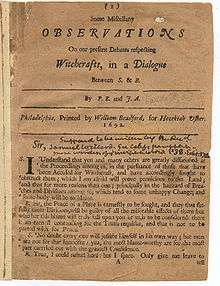Samuel Willard
Reverend Samuel Willard (January 31, 1640 – September 12, 1707) was a colonial clergyman. He was born in Concord, Massachusetts, graduated Harvard in 1659, and was minister at Groton from 1663–1676, whence he was driven by the Indians during King Philip's War. Willard was pastor of the Third Church, Boston from 1678 until his death. He opposed the Salem witch trials, and served as acting president of Harvard from 1701. He published many sermons; the folio volume A Compleat Body of Divinity was published posthumously in 1726.
Samuel Willard | |
|---|---|
 Samuel Willard (1640-1707) | |
| Born | January 31, 1640 |
| Died | September 12, 1707 (aged 67) |
| Resting place | Granary Burying Ground |
| Occupation | Minister |
| Spouse(s) | Abigail Sherman (m. 1664) Eunice Tyng (m. 1679) |
| Signature | |
Early life
Willard's parents were Major Simon Willard and Mary Sharpe, who had emigrated from England to New England in 1634, settling first in Cambridge, Massachusetts. In 1635, with Rev. Peter Bulkley, they established the town of Concord, where Samuel was born the sixth child and second son. After the death of his mother, his father remarried twice, and Samuel was one of seventeen children born to the family.[1] At the age of fifteen, Willard entered Harvard College in 1655, graduating in 1659, and was the only member of his class to receive an M.A.[2]
Ministry in Groton
In 1663, Willard began preaching in Groton, then at the very frontier of the Massachusetts Bay Colony. The town's first minister John Miller had become ill and, when he died, the congregation asked Willard to stay, and he was officially ordained by them in 1664.[3]
On August 8, 1664, Willard married Abigail Sherman of Watertown. In 1670, he became a freeman, with full privileges of citizenship. In 1671, 16-year-old Elizabeth Knapp fell ill and appeared to be possessed. Willard wrote about the strange behavior. Groton was destroyed on March 10, 1676 during King Philip's War, and the 300 residents abandoned the town. Willard and his family removed to Charlestown, Massachusetts.
Ministry in Boston
Willard preached at Boston's Third Church during the illness of Rev. Thomas Thacher and gave an election-day sermon on June 5. The Third Church called Willard to be its Teacher, an associate pastor, on April 10, 1678. When Thacher died on October 15, Willard became their only pastor. Members of the congregation included a variety of influential members of the colony: John Hull, Samuel Sewall, Edward Rawson, Thomas Brattle, Joshua Scottow, Hezekiah Usher, and Capt. John Alden (the son of John and Priscilla Alden of Plymouth). His wife Abigail died sometime in the first half of 1679; in July of that year he married Eunice Tyng, a possible sister-in-law of Joseph Dudley.[4]
While in Boston, he wed Josiah Franklin and Abiah Folger, the parents of American polymath and Founding Father, Benjamin Franklin.
Leading Harvard
Willard was the acting president of Harvard College, although having the nominal title of vice-president, from 1701 until his death in 1707.[5]
Works

- Mercy Magnified on a Penitent Prodigal, or a brief discourse, wherein Christs Parable of the lost Son found, is opened and applied. Boston: Samuel Green, for Samuel Philips. 1684.
- Samuel Willard; Philip English; John Alden (1692). Some Miscellany Observations on Our Present Debates Respecting Witchcraft: In a Dialogue Between S. & B. Philadelphia: William Bradford.
- Some Miscellany Observations On our present Debates respecting Witchcrafts, in a Dialogue Between S. & B.
- "A Compleat Body of Divinity". Boston: B. Green. 1726. Internet Archive
- Some Brief Sacramental Meditations Preparatory for Communion at the Great Ordinance of the Supper (2nd ed.). Boston: Green, Bushell, and Allen. 1743.
- "A briefe account of a strange & unusuall Providence of God befallen to Elizabeth Knap of Groton" in Samuel A. Green, ed., Groton In The Witchcraft Times, Groton, MA: [s.n.] 1883
Notes
- Van Dyken, pp. 13–14.
- Sibley, p. 13.
- Van Dyken, pp. 26–27.
- Quincy, Josiah. The History of Harvard University. John Owen (1840), Vol. I, p. 148.
- Quincy, pp. 145–156.
References
- This article incorporates text from a publication now in the public domain: Gilman, D. C.; Peck, H. T.; Colby, F. M., eds. (1905). . New International Encyclopedia (1st ed.). New York: Dodd, Mead.
Further reading
- Seymour Van Dyken, Samuel Willard, 1640-1707: Preacher of Orthodoxy in an Era of Change (1972); ISBN 0-8028-3408-6
- Ernest Benson Lowrie, The Shape of the Puritan Mind: The Thought of Samuel Willard (1974); ISBN 0-300-01714-6
- John Langdon Sibley (1881). Biographical Sketches of Graduates of Harvard University, in Cambridge, Massachusetts: 1659-1677. II. Cambridge: Harvard University Bookstore. p. 13-36.
- His Daughter, ed. (1892). Life of Samuel Willard, of Deerfield, Mass. Boston: G.H. Ellis. (bio of great-great-grandson)
External links
- Profile, pragmatism.org; accessed September 7, 2015.
- A collection of Samuel Willard's sermons are in the Andover-Harvard Theological Library at Harvard Divinity School in Cambridge, Massachusetts.

- "Samuel Willard". University of Michigan: Evans Early American Imprint Collection.
| Academic offices | ||
|---|---|---|
| Preceded by Increase Mather |
President of Harvard College acting 1701–1707 |
Succeeded by John Leverett |